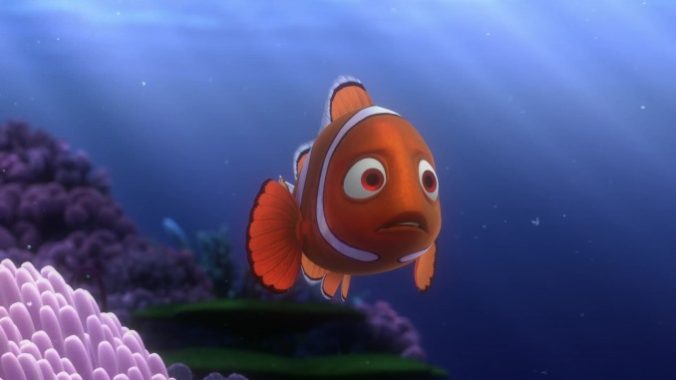Finding Nemo at 20: Disney’s Greatest Trauma Revisited

Disney is the place where dreams come true, and where childhood trauma takes root. Bambi’s mother, gunned down by an unseen hunter in Bambi; Dr. Facilier, yanked all the way to hell by gleeful spirits in The Princess and the Frog; the Walrus chowing down on terrified baby oysters in Alice in Wonderland; Madam Mim’s game of peek-a-pig-a-boo in The Sword in the Stone; every second of Chernabog’s screen time in Fantasia. Write your own list of five, and you’ll still only cover half of Disney’s greatest traumas, and still none of them will measure up to the dread of Finding Nemo’s opening minutes.
Andrew Stanton’s oceanographic drama about a papa clownfish, Marlin (Albert Brooks), darting over reef and surf to find his missing son, Nemo (Alexander Gould), enjoys a spot at the top of Pixar’s body of work 20 years after its initial release; if the film’s visual splendor doesn’t get you, then the grounded and improbably human expression of parent-child dynamics, and particularly its grasp of fatherly anxiety, will. But Finding Nemo’s legacy is better defined by its curtain-raising scene’s efficacy as disaster horror.
In a Disney and Pixar context, there’s nothing unique about this sequence, where a voracious barracuda knocks Marlin unconscious, then devours Coral (Elizabeth Perkins), and their batch of incubating children off-screen. The studio’s proficiency with orchestrating tragedy in the middle of wonder has been built over decades; a fish eating other fish is par for their long-established course. But Finding Nemo has something going for it that similarly upsetting sequences in other Disney-Pixar movies don’t: The audience’s existential awareness that something like this could happen to them, too, a lesson the September 11th attacks taught us all just two years prior to the film’s premiere. One minute, life is sweet. The next, all your hopes and best-laid plans are turned to ruin.
Finding Nemo isn’t a 9/11 movie in a direct sense. Stanton and his team didn’t set out to make a cartoon about fish where nature’s cruel amorality is a metaphor for terrorism. The beginning of its production predated the attacks by about four years, while its theatrical release was far enough after the fact to avoid any appearance of capitalizing on the event. But there’s a subconscious relationship between what happens to Coral, and the eggs, and Marlin, and what happened on the day of the attacks, and how the day pierced our collective consciousness like a tick on the skin. 9/11 changed us all, some for the better, some for the worse.
-

-

-

-

- Curated Home Page Articles By Test Admin October 21, 2025 | 3:10pm
-

- Curated Home Page Articles By Test Admin October 21, 2025 | 2:57pm
- Urls By Test Admin October 21, 2025 | 2:57pm
- Curated Home Page Articles By Test Admin October 21, 2025 | 2:55pm
-

-

-

-

-

-

-

-

-

-

-

-

-

-

-

-

-

-

-

-

-

-

-

-

-

-

-

-

-

-

-




































